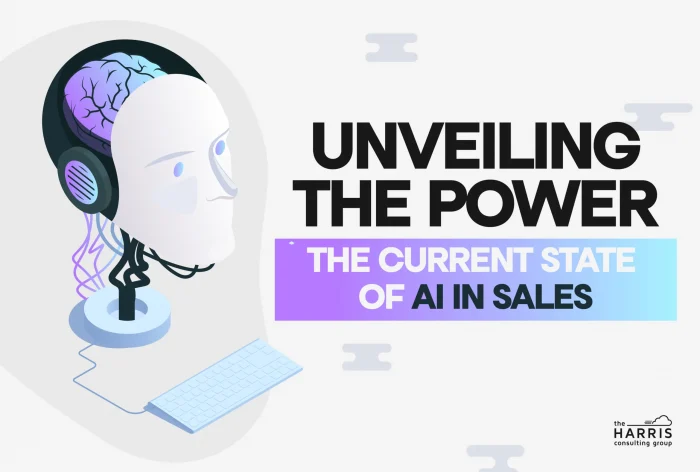Artificial Intelligence (AI) has undeniably revolutionized various industries, and the sales domain is no stranger to its transformative impact. The infusion of AI into sales processes marks a significant shift, ushering in an era characterized by heightened efficiency, personalized interactions, and a foundation built on data-driven decision-making.
This paradigm shift is more than a technological upgrade. It represents a fundamental change in how businesses approach sales strategies and customer engagement. In the following article, we will delve into the current state of AI in sales. Let’s examine the key advancements and strategies that organizations and customers employ to harness the power of AI.
By understanding how businesses leverage this transformative technology, we can gain insights into how everyone navigates an increasingly competitive landscape. This information is crucial to position yourself strategically to stay ahead in the ever-evolving market dynamics.
The Benefits of AI in Sales
The evolution of technology means significant advantages for the niche of sales. These are just some of the most popular benefits experienced by salespeople when implementing AI into their sales strategies.
Time Management
A study in 2022 by Salesforce indicated that a sales rep only spends 28% of their time selling. The high-level understanding is that AI can reduce the manual processes that waste a reps time and allow them to spend time thinking strategically about their prospects and customers.
The immediate impact can be felt when it comes to updating the CRM with quality data from emails, phone calls, chatbots, and other communication sources.
Enhanced Customer Insights:
AI has revolutionized the way businesses gather and analyze customer data. Through machine learning algorithms, sales teams can gain deeper insights into customer behavior, preferences, and buying patterns.
Where this used to be manual, AI can actually do it in seconds. Now a sales rep can highly target and personalize sales strategies. This ensures that each interaction is tailored to meet the specific needs of every customer. #HumanityInSales
Predictive Analytics for Sales Forecasting:
One of the most significant contributions of AI in sales is its ability to predict future trends and outcomes. Predictive analytics powered by AI algorithms can analyze historical sales data, identify patterns, and forecast future sales performance.
This practice aids in making informed business decisions, as it empowers sales teams to address potential challenges and capitalize on emerging opportunities. Also, it strategically positions teams in the market to stay ahead of competitors in an ever-evolving landscape.
Chatbots and Virtual Assistants:
We’ve already been using these for quite some time. And now they will only get better. AI-driven chatbots and virtual assistants have become invaluable tools in the sales process.
These intelligent systems can engage with potential customers, answer queries, and even assist in the initial stages of the sales funnel. By automating routine tasks, sales teams can focus on more complex and strategic aspects of the sales process. This results in increased conversions of the right opportunities in the pipeline.
Automated Lead Scoring:
AI has simplified the lead-scoring process by automating the evaluation of leads based on various criteria. Machine learning algorithms analyze data to determine the likelihood of a lead converting into a customer. This saves time and ensures that sales teams prioritize leads with the highest potential.
This implementation leads to more effective and targeted sales efforts, ultimately fostering a streamlined and optimized sales pipeline. Thus, it enhances overall productivity and increases the likelihood of achieving sales goals.
Dynamic Pricing Optimization:
Surge pricing for Uber or Lyft? Shopping on Amazon? Yes, we’ve already felt the impact of AI on our purchasing decisions. For now, it has mostly been B2C (Business to Consumer).
We believe this will start happening in the B2B (Business to Business) world soon. It may happen first at PLG companies (Product-Led Growth), where there is less human interaction during the sales process.
Artificial Intelligence Algorithms
Dynamic pricing optimization fueled by sophisticated AI algorithms has emerged as a transformative tool. This innovative approach enables businesses to dynamically adjust prices in real-time, considering factors like demand fluctuations, competitor pricing dynamics, and evolving market conditions.
By leveraging this agility in pricing strategies, businesses can stay competitive. Moreover, they can also maximize their revenue potential by aligning prices with market dynamics and customer behavior.
The real-time adaptability of AI-driven dynamic pricing proves particularly advantageous in navigating the intricacies of today’s fast-paced markets. Businesses can swiftly respond to shifts in demand, competitor actions, or other external variables. By doing so, they ensure that prices remain both competitive and reflective of market realities.
This responsiveness enhances the overall flexibility and resilience of pricing structures. Thus, it allows businesses to optimize their revenue streams by capturing opportunities and mitigating risks in an ever-changing business landscape.
The current landscape of AI in sales reflects remarkable advancements that are reshaping the dynamics of customer interactions. The integration of various AI tools, ranging from predictive analytics to chatbots and automated lead scoring, has become instrumental for businesses seeking to elevate their sales processes.
These technologies contribute to heightened efficiency. They provide sales teams with valuable insights and enable them to establish more profound and personalized connections with customers.
The transformative impact of AI in sales is not merely a passing trend but a strategic shift. This is redefining the way businesses approach customer engagement and revenue optimization.
The Fear Factor
The biggest factor everyone should pay attention to when it comes to AI in sales is customer behavior. While there is legitimate concern about AI replacing salespeople, the answer is in the customers’ hands.
When the customer becomes more comfortable purchasing without human interaction, this is when the real concern will happen. As AI technology continues to evolve, its role in sales is poised to expand further, unlocking new possibilities for innovation and growth.
The ongoing evolution of AI in sales signifies a dynamic landscape where businesses can stay at the forefront of technological advancements. In this rapidly evolving scenario, embracing and harnessing the power of AI in sales is no longer a discretionary decision but a strategic imperative.
Those who integrate AI seamlessly into their sales processes enhance operational efficiency and position themselves to adapt to emerging trends and meet evolving customer expectations.
Help your sales team to evolve with personalized training and reach the top of the sales industry!







